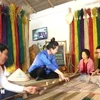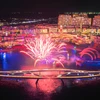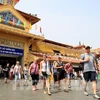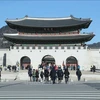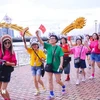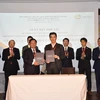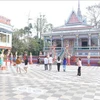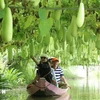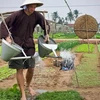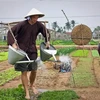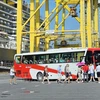 There is one cafe chain in Vietnam that stands out in particular. Kymviet cafe provides a new and heart-warming experience as patrons, served by a team of hearing-impaired people, can order using sign language. Without using words, a waitress bows her head to welcome customers to the cafe. She then offers them menus so they can place an order. The menus are specially designed with sign language. Each drink has detailed sign instructions so customers can know how to use sign language to express their orders. “We have created a lot of tools such as menus for employees with hearing-impairment to help them communicate with customers easier. Customers at our coffee shop can also try to order drinks using sign language," Pham Viet Hoai, CEO of the Kymviet complex, said. (Photo: VietnamPlus)
There is one cafe chain in Vietnam that stands out in particular. Kymviet cafe provides a new and heart-warming experience as patrons, served by a team of hearing-impaired people, can order using sign language. Without using words, a waitress bows her head to welcome customers to the cafe. She then offers them menus so they can place an order. The menus are specially designed with sign language. Each drink has detailed sign instructions so customers can know how to use sign language to express their orders. “We have created a lot of tools such as menus for employees with hearing-impairment to help them communicate with customers easier. Customers at our coffee shop can also try to order drinks using sign language," Pham Viet Hoai, CEO of the Kymviet complex, said. (Photo: VietnamPlus)  The cafe is one of the services provided at the Kymviet complex. The complex was established in 2013 to create job opportunities for the hearing-impaired community. It started with handicrafts made mainly from fabric, and now it is home to over 30 employees with hearing impairment. To create more job options for the staff, the complex broadened its business to food and beverage services. The chain now has three shops in Hanoi, and it provides jobs for eight hearing-impaired people. One cafe is on Trung Van Street, while the two others are on Nguyen Dinh Thi and Vo Chi Cong streets. The staff take turns working at the three shops. (Photo: VietnamPlus)
The cafe is one of the services provided at the Kymviet complex. The complex was established in 2013 to create job opportunities for the hearing-impaired community. It started with handicrafts made mainly from fabric, and now it is home to over 30 employees with hearing impairment. To create more job options for the staff, the complex broadened its business to food and beverage services. The chain now has three shops in Hanoi, and it provides jobs for eight hearing-impaired people. One cafe is on Trung Van Street, while the two others are on Nguyen Dinh Thi and Vo Chi Cong streets. The staff take turns working at the three shops. (Photo: VietnamPlus)  Soldier coffee (Café Linh) in the Hanoi’s Old Quarters offers customers with distinctive eggnog. Just waiting for 2-3 minutes, coffee lovers are served with cups of egg coffee decorated with Hanoi’s iconic features such as Thap Rua (Turtle Tower), Hanoi pole, and Hanoi Old Quarter. Soldier Coffee also impresses customers with its “soldier space” with wartime paraphernalia collected by its owner Le Tuan Nghia during his trips across the nation. Hanoi’s egg coffee is thought to have originated from a bartender at the Metropole Hotel, Nguyen Van Giang, who invented a recipe to use whisked egg yolk as a substitute for fresh milk that was often hard to come by in the 1940s. Egg yolk is whipped until it becomes a creamy soft, meringue-like white foam and is poured into a cup with hot black condensed coffee that seeps through the foam so it perches on top of the cup. (Photo: VietnamPlus)
Soldier coffee (Café Linh) in the Hanoi’s Old Quarters offers customers with distinctive eggnog. Just waiting for 2-3 minutes, coffee lovers are served with cups of egg coffee decorated with Hanoi’s iconic features such as Thap Rua (Turtle Tower), Hanoi pole, and Hanoi Old Quarter. Soldier Coffee also impresses customers with its “soldier space” with wartime paraphernalia collected by its owner Le Tuan Nghia during his trips across the nation. Hanoi’s egg coffee is thought to have originated from a bartender at the Metropole Hotel, Nguyen Van Giang, who invented a recipe to use whisked egg yolk as a substitute for fresh milk that was often hard to come by in the 1940s. Egg yolk is whipped until it becomes a creamy soft, meringue-like white foam and is poured into a cup with hot black condensed coffee that seeps through the foam so it perches on top of the cup. (Photo: VietnamPlus)  Located in busy Cau Giay district, Treeland Coffee is billed as a miniature of Da Lat in Hanoi that is suited to those seeking a space for coffee and communication with nature. More than just an array of offerings, from coffee, tea, fruits and cakes, the coffee shop has unique designs and features evoking nostalgia. This is an ideal retreat for couples and people looking for quiet working space. CNN once named Vietnam in the list of top places where its viewers and readers can find the best coffee in the world. "Coffee is an indispensable part of Vietnamese culture as the country is well-known as one of the biggest producers of beans in the world," the U.S. cable TV channel. Black coffee, iced coffee with condensed milk and coconut coffee (frozen coconut milk mixed with rich black coffee topped with shaved coconut ice) are among Hanoians’ favorites, CNN said. (Photo: VietnamPlus)
Located in busy Cau Giay district, Treeland Coffee is billed as a miniature of Da Lat in Hanoi that is suited to those seeking a space for coffee and communication with nature. More than just an array of offerings, from coffee, tea, fruits and cakes, the coffee shop has unique designs and features evoking nostalgia. This is an ideal retreat for couples and people looking for quiet working space. CNN once named Vietnam in the list of top places where its viewers and readers can find the best coffee in the world. "Coffee is an indispensable part of Vietnamese culture as the country is well-known as one of the biggest producers of beans in the world," the U.S. cable TV channel. Black coffee, iced coffee with condensed milk and coconut coffee (frozen coconut milk mixed with rich black coffee topped with shaved coconut ice) are among Hanoians’ favorites, CNN said. (Photo: VietnamPlus)  Refined coffee’s slogan “Drink as much as you can, pay as much as you want” has made passersby feel curious to walk in. Although the shop is designed to serve only eight customers at the same time, it is worth a try as coffee aficionados have the chance to see how a cup of tasty coffee is made. Its owner, Vu Dinh Tu, wants to create a coffee space in which people are able to enjoy the coffee by five senses. Only five coffee drinks are offered on the menu; however, the coffee shop has left indelible impression on its customers with strong coffee fragrance and gentle jazz music. (Photo: VietnamPlus)
Refined coffee’s slogan “Drink as much as you can, pay as much as you want” has made passersby feel curious to walk in. Although the shop is designed to serve only eight customers at the same time, it is worth a try as coffee aficionados have the chance to see how a cup of tasty coffee is made. Its owner, Vu Dinh Tu, wants to create a coffee space in which people are able to enjoy the coffee by five senses. Only five coffee drinks are offered on the menu; however, the coffee shop has left indelible impression on its customers with strong coffee fragrance and gentle jazz music. (Photo: VietnamPlus)  Tiem cao cao (Grasshopper coffee shop) tucked inside small alleyway of crowded Dao Tan Street, Ba Dinh district, is truly suitable for those seeking a quiet space for coffee. Trees and craft products are arranged around the shop for customers to enjoy a slower pace of life. The first coffee beans were imported into Vietnam in the 19th century by French colonialists, who realised that the climate of the central highlands was perfect for growing the popular drink. For the Vietnamese, coffee provides much more than just a shot of energy – it is a way of life. As for foreigners, they have a lot more added to their coffee besides milk and sugar when tasting coffee in Vietnam. Several popular concoctions on offer include salt coffee, egg coffee, coconut coffee, and yogurt coffee, among others. (Photo: VietnamPlus)
Tiem cao cao (Grasshopper coffee shop) tucked inside small alleyway of crowded Dao Tan Street, Ba Dinh district, is truly suitable for those seeking a quiet space for coffee. Trees and craft products are arranged around the shop for customers to enjoy a slower pace of life. The first coffee beans were imported into Vietnam in the 19th century by French colonialists, who realised that the climate of the central highlands was perfect for growing the popular drink. For the Vietnamese, coffee provides much more than just a shot of energy – it is a way of life. As for foreigners, they have a lot more added to their coffee besides milk and sugar when tasting coffee in Vietnam. Several popular concoctions on offer include salt coffee, egg coffee, coconut coffee, and yogurt coffee, among others. (Photo: VietnamPlus) VNA

